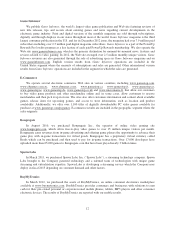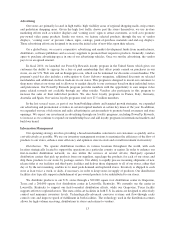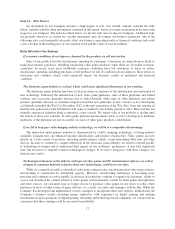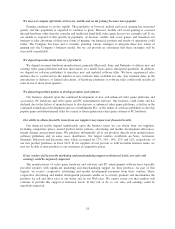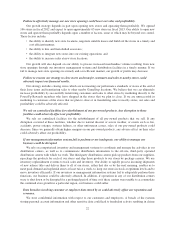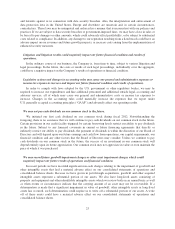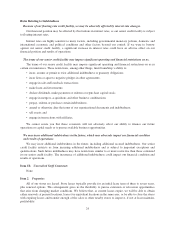GameStop 2012 Annual Report Download - page 32
Download and view the complete annual report
Please find page 32 of the 2012 GameStop annual report below. You can navigate through the pages in the report by either clicking on the pages listed below, or by using the keyword search tool below to find specific information within the annual report.Item 1A. Risk Factors
An investment in our Company involves a high degree of risk. You should carefully consider the risks
below, together with the other information contained in this report, before you make an investment decision with
respect to our Company. The risks described below are not the only ones facing our Company. Additional risks
not presently known to us, or that we consider immaterial, may also impair our business operations. Any of the
following risks could materially adversely affect our business, operating results or financial condition, and could
cause a decline in the trading price of our common stock and the value of your investment.
Risks Related to Our Business
If economic conditions do not improve, demand for the products we sell may decline.
Sales of our products involve discretionary spending by consumers. Consumers are typically more likely to
make discretionary purchases, including purchasing video game products, when there are favorable economic
conditions. In recent years, poor worldwide economic conditions have led consumers to delay or reduce
discretionary spending, including purchases of the products we sell. If conditions do not improve, these delays or
reductions may continue, which could negatively impact our business, results of operations and financial
condition.
The electronic game industry is cyclical, which could cause significant fluctuation in our earnings.
The electronic game industry has been cyclical in nature in response to the introduction and maturation of
new technology. Following the introduction of new video game platforms, sales of these platforms and related
software and accessories generally increase due to initial demand, while sales of older platforms and related
products generally decrease as customers migrate toward the new platforms. A new console cycle is developing
as Nintendo launched the Wii U in November 2012 as the next generation of the Wii. Also, Sony has announced
that the next generation of the PlayStation will come to market by the holiday period of 2013. Microsoft has not
formally announced definitive plans to introduce a new console. We expect sales of our products to decline until
the launch of these new consoles. If video game platform manufacturers delay or fail to develop new hardware
platforms, or the platforms are not successful, our sales of video game products could decline.
If we fail to keep pace with changing industry technology, we will be at a competitive disadvantage.
The interactive entertainment industry is characterized by swiftly changing technology, evolving industry
standards, frequent new and enhanced product introductions and product obsolescence. Video games are now
played on a wide variety of products, including mobile phones, tablets, social networking Web sites and other
devices. In order to continue to compete effectively in the electronic game industry, we need to respond quickly
to technological changes and to understand their impact on our customers’ preferences. It may take significant
time and resources to respond to these technological changes. If we fail to keep pace with these changes, our
business may suffer.
Technological advances in the delivery and types of video games and PC entertainment software, as well as
changes in consumer behavior related to these new technologies, could lower our sales.
While it is currently possible to download video game content to the current generation video game systems,
downloading is constrained by bandwidth capacity. However, downloading technology is becoming more
prevalent and continues to evolve rapidly. If advances in technology continue to expand our customers’ ability to
access and download the current format of video games and incremental content for their games through these
and other sources, our customers may no longer choose to purchase video games in our stores or reduce their
purchases in favor of other forms of game delivery. As a result, our sales and earnings could decline. While the
Company has developed and implemented various strategies to incorporate these new delivery methods into the
Company’s business model, including hiring employees with experience in digital gaming and making
investments in and acquisitions of digital gaming, streaming and technology-based companies, we can provide no
assurances that these strategies will be successful or profitable.
17







